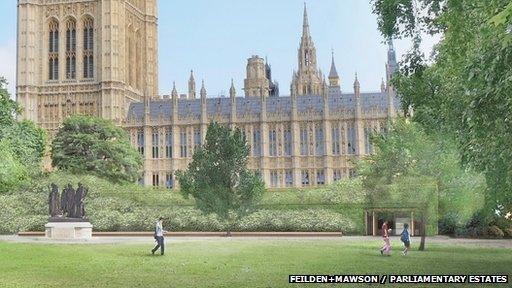Assisted Dying Bill takes a rest
- Published
Former lord chancellor Lord Falconer's Assisted Dying Bill won't make it to the wicket in this parliamentary session; but it's in pole position for the new parliamentary year which beings in May.
The Labour peer tabled his bill last May, but it was too low in the batting order to get a worthwhile debating slot.
He's traded the chance of a late second reading debate, which would not go much further, for assurances from the House authorities of a better chance of full discussion in the next session - perhaps even the opportunity to send a bill to the Commons, or even have a parallel bill debated by MPs at the same time.
Under Lord Falconer's bill a patient would have to prove they have the mental capacity to make a voluntary and informed choice, were not being unduly influenced by others and had a "settled intention" about their wish to die.
And their condition would have to be independently assessed by two doctors and other healthcare professionals.
He has taken up the cause pursued by his colleague Lord Joffe, who has made a couple of attempts to get a bill along these lines through the House.
The subject isn't going away.
MPs like Richard Ottaway have been pushing the issue in the Commons and in the Scottish Parliament, the veteran MSP Margo MacDonald has tabled the Assisted Suicide (Scotland) Bill.
In, out, in, out, shake it all about
One of the knock-on implications of the recent High Court ruling that suggested, almost in passing, that the EU Charter of Fundamental Rights applied to the UK (even though Britain negotiated an opt out before the Lisbon Treaty was signed in 2007), could be a bigger Tory rebellion on another Euro-issue.

Prince Charles shows how the hokey cokey is done
Britain has opted out of more than a hundred EU Justice and Home Affairs powers and is in the process of opting back in to some 30 of them.
There's been a bit of a pause on this extremely important issue, while four select committees have been studying the issue.
They have now reported and a Commons vote should follow at some point soon.
A lot of Conservatives are very unhappy about this issue - seeing it as acceptance of a creeping EU influence over immigration, policing and criminal justice.
And this is the importance of the remarks about the applicability of the Charter to Britain by Mr Justice Mostyn - they highlight the threat of "leakage" in the British opt-out.
"It should mean another 20-30 rebels when the vote comes," once Conservative predicted.
Feeling the pinch
It will be a familiar public service tale of spending cuts warring with pressure for more spending when MPs spend part of tomorrow (Thursday) afternoon debating the finances of the Commons.
On the one hand, the Commons has slashed its annual budget from £238m in 2010 to £200.6 now, without affecting its core functions as a parliamentary body.
Cuts to subsidies to the bars and restaurants, plus more efficient procurement have made the savings relatively painless, at least to MPs, although some plan to point to what they say is miserable staff morale in the palace.
But there are more spending challenges to come.
The increasingly assertive select committees would all like to have more money at their disposal - they gaze enviously at the impact the Public Accounts Committee has, thanks in part to the fact that it is supported by the formidable research prowess of the National Audit Office.
But the pushback against that is to get them to spell out exactly what they would do, given extra dosh.
A good case for more research backup might find favour with the powers that be; an extra budget for luxury accommodation on foreign trips would not.
Young visitors
Meanwhile the eye-catching initiative to build a new £7 million Education Centre on Victoria Gardens, next to the Palace of Westminster, remains controversial, both in the Commons and between the Commons at the Lords.
One major attraction of the scheme is that the 45,000 schoolchildren who visit Parliament every year are clogging up the works.
Parliament wants that figure to rise to 55,000, but the existing facilities would not cope with the extra visitors.

Feilden+Mawson's proposed design for the the new education centre (foreground)
Routing them through a purpose-designed centre, with adequate teaching space, bag storage and - crucially - toilets, would cut congestion in busy Portcullis House.
More than that, the view is that children who visit Parliament and more likely to be engaged in the political process.
But if MPs want to oppose the scheme, this debate gives them the chance; the debate is on an amendable motion, so they can try to strike it out.